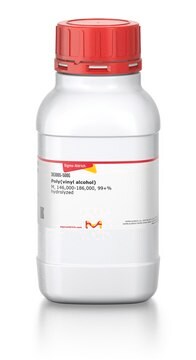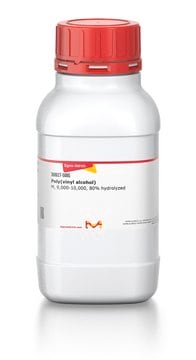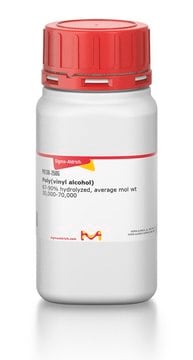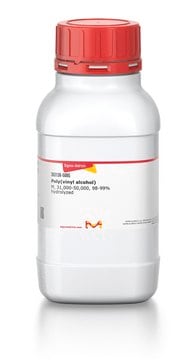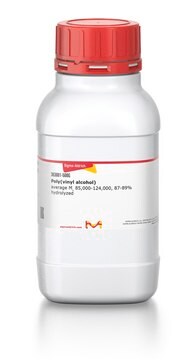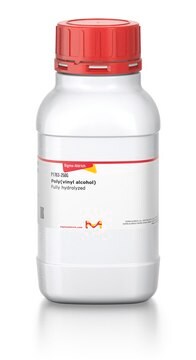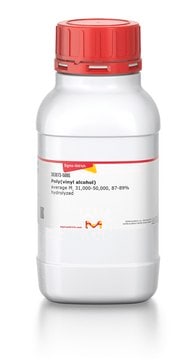363146
Poly(vinyl alcohol)
Mw 85,000-124,000, 99+% hydrolyzed
Synonym(s):
PVA
About This Item
Recommended Products
Quality Level
form
powder or crystals
mol wt
Mw 85,000-124,000
falling ball
28-32 cP, 4 % in H2O(20 °C)(lit.)
InChI
1S/C2H4O/c1-2-3/h2-3H,1H2
InChI key
IMROMDMJAWUWLK-UHFFFAOYSA-N
Looking for similar products? Visit Product Comparison Guide
General description
Application
- Poly (vinyl alcohol) recent contributions to engineering and medicine: This article discusses the diverse applications of PVA in engineering and medical fields, emphasizing its versatility and potential in various domains (Feldman, 2020).
- Chemical modification of poly (vinyl alcohol) in water: This study explores the chemical modification processes of PVA, enhancing its functional properties for advanced material applications (Awada & Daneault, 2015).
- Crosslinked poly (vinyl alcohol) hydrogels for wound dressing applications: Reviews the use of PVA in creating hydrogel dressings for medical applications, demonstrating the material′s effectiveness in healing and treatment scenarios (Kamoun et al., 2015).
- A review on mechanical and water absorption properties of polyvinyl alcohol based composites/films: This review focuses on the mechanical and water absorption properties of PVA composites, crucial for developing advanced materials in various scientific and industrial applications (Jain et al., 2017).
- Properties and applications of polyvinyl alcohol, halloysite nanotubes and their nanocomposites: Analyzes the synthesis, properties, and applications of PVA-based nanocomposites, highlighting their significant potential in nanotechnology and material science (Gaaz et al., 2015).
Storage Class Code
11 - Combustible Solids
WGK
WGK 1
Flash Point(F)
No data available
Flash Point(C)
No data available
Personal Protective Equipment
Regulatory Listings
Regulatory Listings are mainly provided for chemical products. Only limited information can be provided here for non-chemical products. No entry means none of the components are listed. It is the user’s obligation to ensure the safe and legal use of the product.
JAN Code
363146-1KG:
363146-BULK:
363146-25G:
363146-VAR:
363146-500G:
Choose from one of the most recent versions:
Already Own This Product?
Find documentation for the products that you have recently purchased in the Document Library.
Customers Also Viewed
Our team of scientists has experience in all areas of research including Life Science, Material Science, Chemical Synthesis, Chromatography, Analytical and many others.
Contact Technical Service
